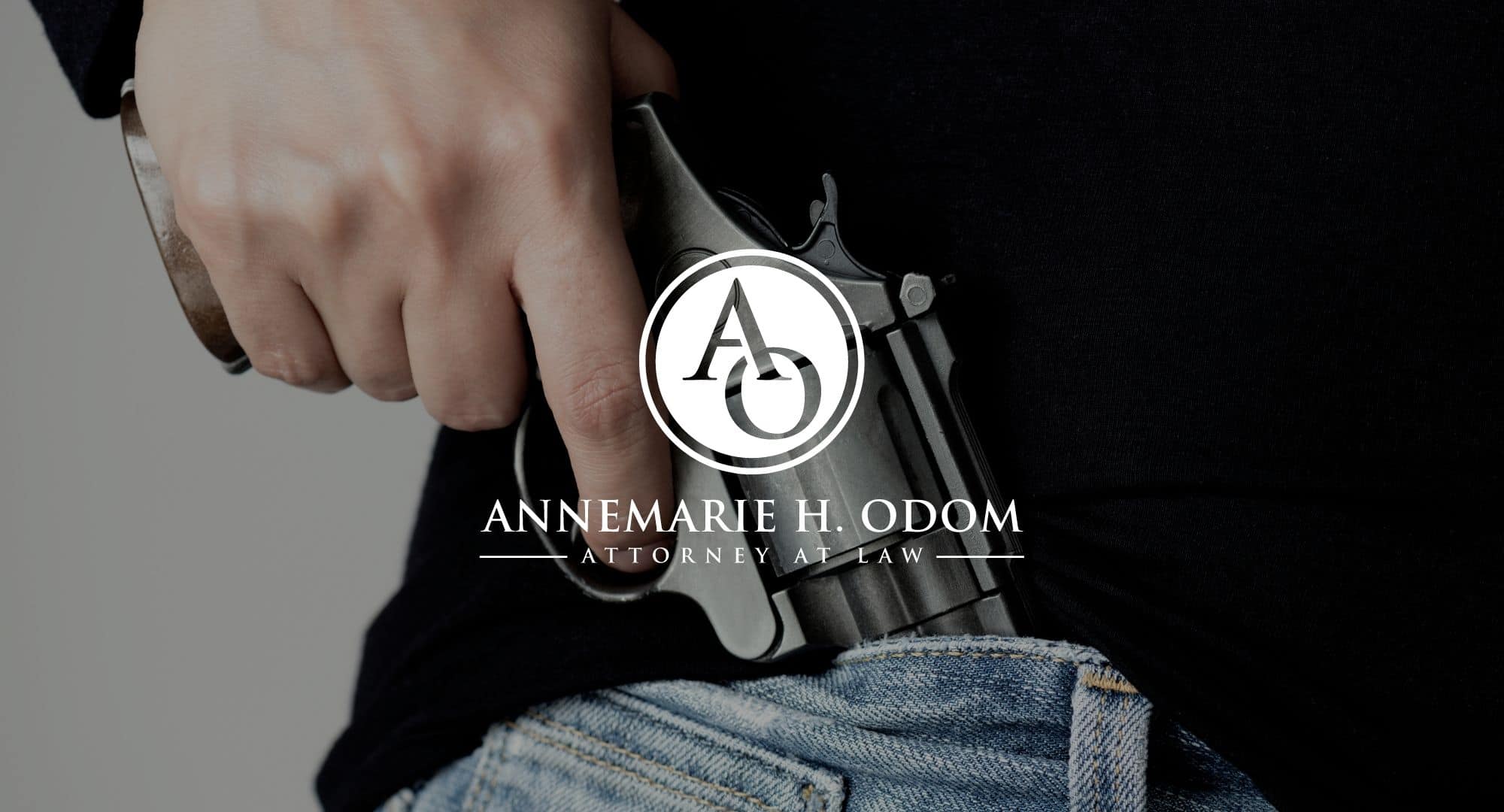Weapons Charges
Practice Areas
Greenville, South Carolina Gun Possession Lawyer
Weapons charges in South Carolina cover a broad range of criminal offenses based on the unlawful possession or use of firearms. With gun laws and enforcement in South Carolina only becoming more and more strict, the penalties for these types of convictions are also increasing in severity. That’s why, if you sustain a gun charge of any kind, you need a South Carolina gun possession defense attorney who understands the complex nature of these crimes and how best to defend against them.

AnneMarie Odom is an experienced and knowledgeable Greenville criminal defense lawyer who is prepared to defend and safeguard your legal rights for the duration of your case. Rest assured, the legal team at AnneMarie Odom Law will help you navigate the complexities of South Carolina gun laws and achieve the best possible outcome for your situation.
Gun Laws in South Carolina
Gun laws in South Carolina include the regulations of sale, possession, and use of both firearms and ammunition. These regulations especially focus on:
- Illegal weapon possession
- Prohibited individual possession of weapon (e.g., convicted felons or parole/probation individuals)
- Imitation gun offenses
- Legal gun possession without permit or license
- Juvenile weapon possession
- Weapon possession during the commision of an inherently dangerous crime (e.g., robbery with deadly weapon) or on school property
- Possession of firearm with intent of an unlawful purpose
Common Weapons Charges in South Carolina
The most common gun crimes we see at AnneMarie Odom Law are the unlawful carrying or possession of a firearm during the commission of a violent crime in South Carolina. Violent crimes may include assault and battery, homicide, domestic violence, or robbery, to name a few. Unlawful carrying entails the improper carry or storage of a firearm. SC Code § 16-23-20 makes it unlawful for anyone to carry any handgun, concealed or not, with some exceptions. Unlawful possession, on the other hand, is the possession of a firearm by a prohibited person or the possession of guns “from which the original serial number has been removed or obliterated.” SC Code §§ 16-23-500, 16-23-30, and 16-23-50 discuss the definitions and exceptions of unlawful possession charges.
Other charges include the unlawful pointing, presenting, or discharging of a firearm in South Carolina. Pointing or presenting, as found in SC Code Section 16-23-410, refers to any threatening manner of firearm display, loaded or not. The unlawful discharging of a firearm is causing the firing of or directly firing weapon at or into a vehicle or home. SC Code Section 16-23-440(A) covers “drive-by shootings,” and the limitations or extensions of what constitutes home or vehicle definitions.
Potential Defenses to Gun Charges
Depending on the case at hand, South Carolina gun lawyers may use the following common defenses for gun charges:
- Alibi
- Mere Presence
- Mistaken identity
- Illegal search and seizure
- Improper, inadequate, or absent Miranda warnings
- Improper questioning by investigators or police officers
Federal Gun Laws
The right of individuals to keep and bear arms is governed by the Second Amendment to the United States Constitution. However, there are still several state and federal regulations that govern the use of firearms in the United States. In fact, gun charges in South Carolina can be prosecuted at either the state or federal court level.
Federal gun laws can be found throughout multiple federal statutes. They cover a wide range of governing and regulating the manufacturing, trade, possession, transfer, and record-keeping, as well as the transport of firearms, ammunition, and any firearm accessories.
SC CWP Law
Before an individual can carry a concealed weapon in South Carolina, they must first obtain the proper permit. South Carolina’s Concealed Weapons Permit has a number of requirements. In order to obtain a South Carolina Handgun License, the following must be met:
- Must be 21 years of age or older
- Complete an application signed by the applicant
- Submit a photocopy of driver’s license or photographic identification card
- Submit proof of residence of South Carolina OR submit proof of ownership of real property in South Carolina if you are not a permanent resident
- Submit proof of actual or corrected vision rated at 20/40 within six months of the date of application (this is not necessary if you have a valid driver’s license)
- Submit proof of training
- Original or certified copy of training certificate
- Must be within three (3) years before filing an application
- Shows that you successfully completed a basic or advanced handgun education course offered by a state, county, or municipal law enforcement agency or a nationally recognized organization that promotes gun safety
- Payment of the $50 application fee. This fee is waived for disabled veterans and retired law enforcement officers
- Submit a complete set of fingerprints
SC Concealed Weapons Permit FAQs
South Carolina Law Enforcement Division (SLED) issues and renews concealed weapons permits in South Carolina.
Yes, it exempts you from a National Instant Criminal System (NICS) check when purchasing a firearm.
It is valid for five years if issued after February 11, 2014.
Up to 90 days from the date they receive your application or up to 30 days processing time for renewals.
The fee for a five year license (new or renewal) is $50.
How Much Time Do You Get For a Gun Charge?
The penalty for unlawful carry is a misdemeanor, which is punishable by one year in prison and/or a fine of up to one thousand dollars. The penalty for unlawful possession is a felony carrying up to five years of prison and/or a fine of up to two thousand dollars. The penalty for illegal discharge is a felony punishable with up to ten years of prison time and/or a fine of up to one thousand dollars.
What is a Federal Gun Charge?
A federal crime is the highest level crime you can be charged with. This means you violated national laws, not just state law, and will require you to obtain a federal defense attorney to defend you in your case. Many times, federal crimes occur from an already convicted felon committing another crime with, using, or in possession of a firearm.
What are the Four Types of Federal Weapons Charges?
1. Felon in Possession – a convicted felon having firearm possession. This is a Class D felony and may result in up to 10 years in prison, 3 years of probation, and/or $250,000 in fines.
Note: Some weapons are illegal for any citizen to possess. These include machine guns, sawed-off shotguns, bombs/explosives, silencers, switchblades, and more.
2. Firearms Trafficking – Crimes crossing state borders can be charged as federal offenses. Smuggling weapons or ammunition across state lines classify as a federal weapons offense.
3. Violent Crime – Regardless of if there is no injury or fatality resulting, anyone with a firearm “during and in relation to any crime of violence” or who “possesses a firearm in furtherance of any such crime” can be charged with a violent crime.
- A crime of violence is a felony offense and is defined as:
- The involvement, use, attempted use, or threatened use of physical force against the person or property of another, or
- Involving a substantial risk that physical force against the person or property of another may be used in the course of committing the offense.
4. Fraud – the obtaining of or possession of a fake permit to purchase, hold, or use a weapon.
How to Beat a Federal Gun Charge
Federal gun laws are complex, but not without loopholes, good defenses, and exceptions. For instance, one exception to federal firearm charges includes the possession of a gun due to duress or necessity while under unlawful and imminent threat of serious bodily injury or death. The possession of antique weapons is also exempt from many federal firearm charges.
When it comes to federal gun charge defenses, there are many legal avenues to explore. For example, the violation of constitutional rights during the seizure of weapons or other law enforcement conduct is a very commonly relied on defense.
Other common defenses to federal firearm charges include insufficient evidence to support a conviction and lack of knowledge. An important part of federal gun charges is that the defendant must have acted “knowingly.” Say, for example, you are an innocent buyer of a firearm with no knowledge that the seller stole the firearm. In this case, you cannot have knowingly possessed the stolen firearm.
Whatever defense strategy is employed, it is important that it’s coming from a knowledgeable and experienced criminal defense lawyer. Our federal criminal defense lawyers at AnneMarie Odom Law have considerable experience representing defendants in federal court and can utilize our in-depth knowledge of gun laws and the federal legal system to your benefit.
Gun Lawyer Near Me
If you have been charged with a weapon or firearm offense in South Carolina, you shouldn’t try to fight this charge on your own. With so much at stake, it’s imperative that you equip the help of a gun possession lawyer who knows what it takes to defend you, your rights, and your future. At AnneMarie Odom Law, we are able to represent clients in South Carolina and across the United States, with licenses to operate in both state and federal courts. Call the law firm of AnneMarie Odom today at (864) 775-5833 to schedule a free consultation to discuss the specifics of your case. You can also contact us by completing our online intake form below.

Contact a Greenville gun possession defense attorney at AnneMarie Odom Law to discuss your situation and work towards building the best possible defense for your case today.
— OR —
